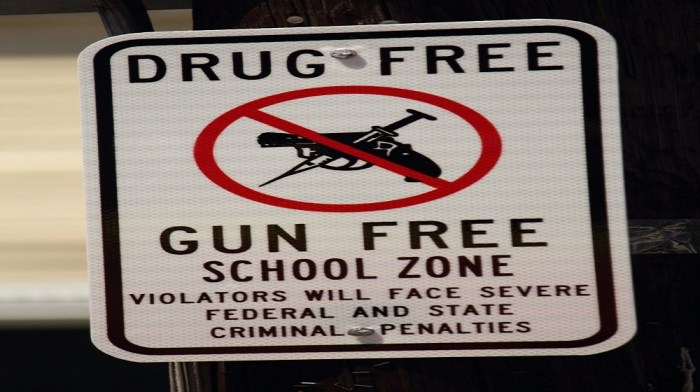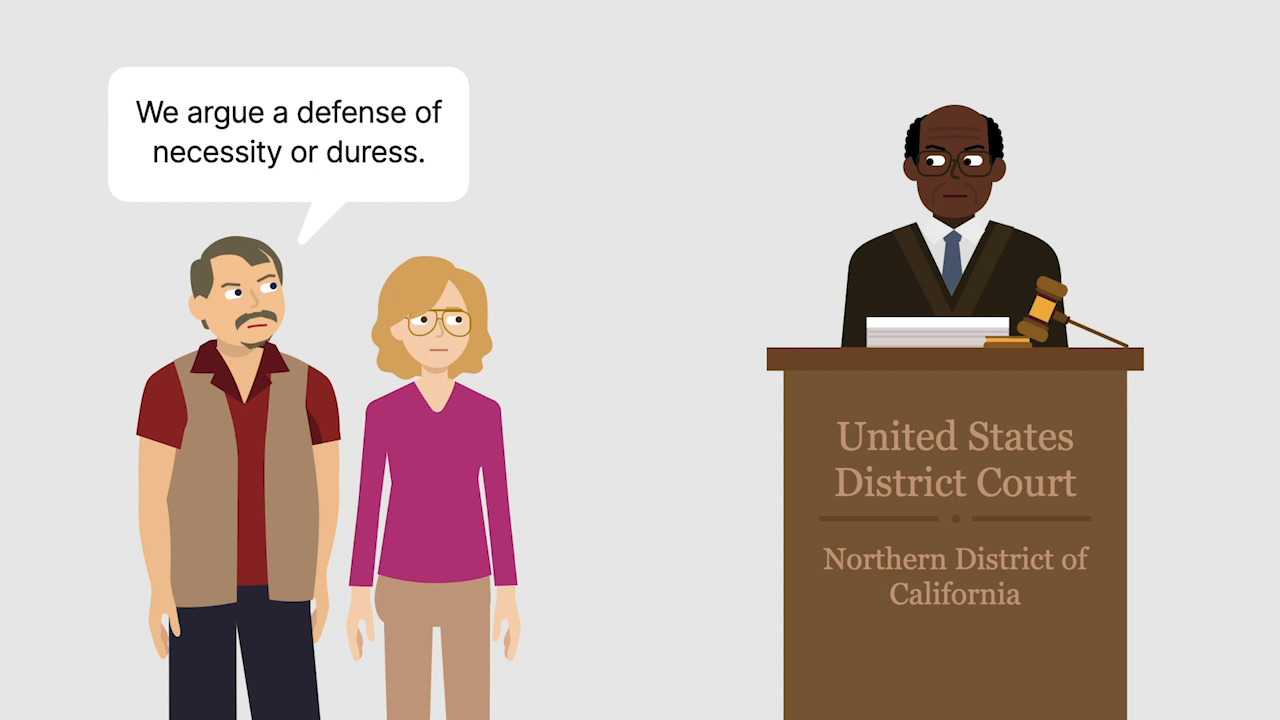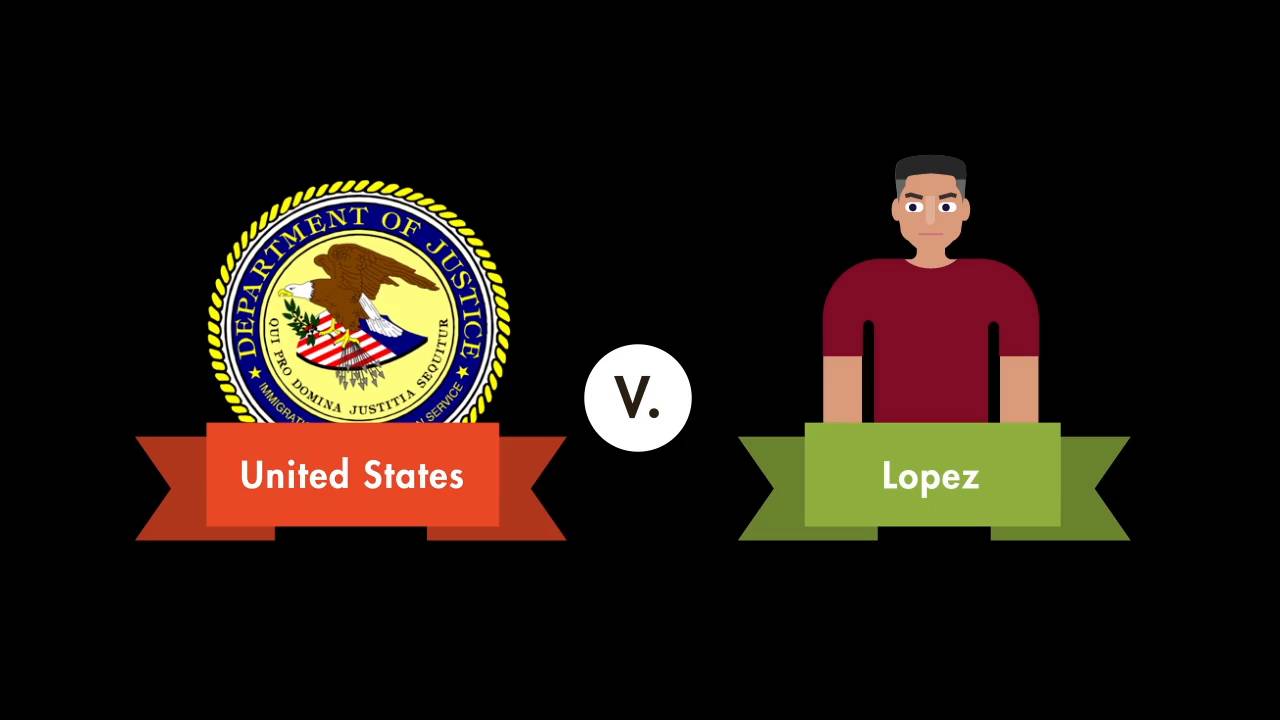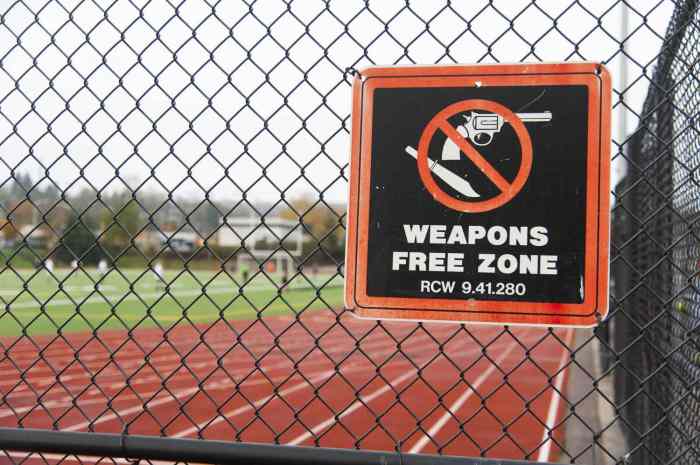United states v lopez quimbee – In the annals of constitutional law, United States v. Lopez stands as a pivotal moment, shaping the delicate balance between federal authority and individual rights. This case ignited a fierce debate over the scope of the Commerce Clause, leaving an enduring legacy on the relationship between the federal government and its citizens.
At the heart of the controversy lay the Gun-Free School Zones Act of 1990, a well-intentioned attempt to curb gun violence in schools. However, the Supreme Court, in a landmark 1995 decision, struck down the law, holding that it exceeded the Commerce Clause’s limitations.
Gun-Free School Zones Act of 1990: United States V Lopez Quimbee

The Gun-Free School Zones Act (GFSZA) was enacted in 1990 to establish federal authority over gun-free school zones.
Provisions
The GFSZA prohibits the possession of a firearm within 1,000 feet of a school zone. The Act defines a school zone as any public, private, or parochial elementary, secondary, or vocational school.
In the landmark case United States v. Lopez, the Supreme Court ruled that the Gun-Free School Zones Act exceeded Congress’s power under the Commerce Clause. The decision sparked a debate about the limits of federal authority, and has been cited in numerous subsequent cases.
T.S. Eliot’s “The Waste Land” , a modernist poem that explores themes of fragmentation and alienation, provides a poignant lens through which to view the implications of Lopez. The poem’s haunting imagery and fragmented structure reflect the fractured nature of American society, and its exploration of the loss of faith and meaning resonates with the sense of disillusionment that permeates Lopez.
Purpose and Intended Scope
The purpose of the GFSZA was to reduce gun violence in schools. The Act was intended to create a safe environment for students and staff by prohibiting the presence of firearms in school zones.
Application
The GFSZA has been applied in a variety of cases, including:
- United States v. Lopez(1995): The Supreme Court held that the GFSZA was unconstitutional because it exceeded Congress’s commerce power.
- United States v. Alfonso(2002): The Supreme Court held that the GFSZA was constitutional as applied to a school zone that was located within a national park.
- United States v. Booker(2005): The Supreme Court held that the GFSZA was constitutional as applied to a school zone that was located on a military base.
Commerce Clause

The Commerce Clause is a provision of the United States Constitution that grants Congress the power to “regulate Commerce with foreign Nations, and among the several States, and with the Indian Tribes.”
The Commerce Clause is one of the most important and expansive powers granted to Congress. It has been interpreted by the Supreme Court to give Congress the authority to regulate a wide range of activities that affect interstate commerce, including the production, distribution, and sale of goods and services, as well as the transportation of people and goods across state lines.
Limits of the Commerce Clause
However, the Commerce Clause is not unlimited. The Supreme Court has held that Congress may only regulate activities that “substantially affect” interstate commerce. In addition, the Court has held that Congress may not regulate activities that are “local in nature” or that have only a “de minimis” effect on interstate commerce.
The Gun-Free School Zones Act of 1990 was challenged on the grounds that it exceeded Congress’s power under the Commerce Clause. The Supreme Court struck down the law, holding that it was not a valid exercise of Congress’s commerce power because it did not regulate an activity that substantially affected interstate commerce.
Lopez Case
The United States v. Lopez case was a landmark Supreme Court decision that limited the scope of the Commerce Clause. The case involved a challenge to the Gun-Free School Zones Act of 1990, which prohibited the possession of guns in school zones.
Facts of the Case
In 1995, Alfonso Lopez Jr. was arrested for carrying a gun in a school zone in San Antonio, Texas. He was charged with violating the Gun-Free School Zones Act. Lopez argued that the law was unconstitutional because it exceeded Congress’s power under the Commerce Clause.
Arguments Presented, United states v lopez quimbee
The government argued that the Gun-Free School Zones Act was a valid exercise of Congress’s commerce power because it regulated an activity that substantially affected interstate commerce. The government claimed that the presence of guns in schools disrupted the educational process, which in turn affected the national economy.Lopez
argued that the law was not a valid exercise of Congress’s commerce power because it did not regulate an activity that substantially affected interstate commerce. Lopez claimed that the law was simply a criminal prohibition that did not have a substantial effect on the national economy.
Supreme Court’s Decision
The Supreme Court ruled in favor of Lopez, holding that the Gun-Free School Zones Act was unconstitutional because it exceeded Congress’s power under the Commerce Clause. The Court held that the law did not regulate an activity that substantially affected interstate commerce, and that it was therefore not a valid exercise of Congress’s commerce power.The
Court’s decision in Lopez was a significant limitation on the scope of the Commerce Clause. The decision made it more difficult for Congress to regulate activities that do not have a substantial effect on interstate commerce.
Impact of Lopez Decision

The Lopez decision had a significant impact on the Gun-Free School Zones Act and the broader scope of federal regulation of activities affecting interstate commerce.
Immediate Impact on Gun-Free School Zones Act
The immediate impact of the Lopez decision was to invalidate the Gun-Free School Zones Act of 1990. The Court held that the Act exceeded Congress’s authority under the Commerce Clause because it did not regulate an economic activity that substantially affected interstate commerce.
Broader Implications for Federal Regulation
The Lopez decision has broader implications for federal regulation of activities that affect interstate commerce. The Court’s narrow interpretation of the Commerce Clause has made it more difficult for Congress to regulate activities that do not have a substantial economic impact on interstate commerce.
Application in Subsequent Cases
The Lopez decision has been applied in subsequent cases to invalidate other federal laws that were found to exceed Congress’s authority under the Commerce Clause. For example, in United States v. Morrison (2000), the Court struck down the Violence Against Women Act because it did not regulate an economic activity that substantially affected interstate commerce.
Congressional Response to Lopez

The Lopez decision sparked significant debate and prompted Congress to reconsider the scope of its commerce power. In response, Congress enacted the Violent Crime Control and Law Enforcement Act of 1994 (VCCLEA) to address the concerns raised by the Supreme Court.
The VCCLEA included several provisions aimed at expanding federal authority over gun-related crimes and addressing the issue of school safety. One key provision of the VCCLEA was the Gun-Free School Zones Act (GFSZA), which made it a federal crime to possess a firearm in a school zone.
Effectiveness of the Violent Crime Control and Law Enforcement Act
The VCCLEA has been a controversial piece of legislation, with some arguing that it has been effective in reducing gun violence and others arguing that it has had little impact. There is some evidence to suggest that the GFSZA has been effective in reducing the number of school shootings.
However, there is also evidence to suggest that the VCCLEA has had a disproportionate impact on minority communities.
Current Status of Gun-Free School Zones Act
The Gun-Free School Zones Act (GFSZA) remains in effect, despite the Supreme Court’s ruling in Lopez. However, the Act’s scope and effectiveness are still debated.
Ongoing Debate
Some argue that the GFSZA is an effective deterrent to gun violence in schools. They point to studies showing a decline in school shootings after the Act was passed. Others argue that the Act is ineffective and that it infringes on the Second Amendment rights of law-abiding citizens.
Potential for Future Challenges
The Lopezdecision has raised questions about the constitutionality of the GFSZA. Some legal scholars believe that the Act could be struck down if it is challenged in court. However, it is also possible that the Supreme Court would uphold the Act, finding that it is a valid exercise of Congress’s power to regulate interstate commerce.
FAQ Resource
What was the main issue in United States v. Lopez?
The Supreme Court ruled that the Gun-Free School Zones Act exceeded the Commerce Clause’s limitations because it regulated an activity that did not substantially affect interstate commerce.
How did Lopez impact the federal government’s ability to regulate activities?
Lopez established a precedent that limited the federal government’s ability to regulate activities that only indirectly affect interstate commerce.
What is the current status of the Gun-Free School Zones Act?
The Gun-Free School Zones Act remains in effect, but its scope has been narrowed by the Lopez decision.